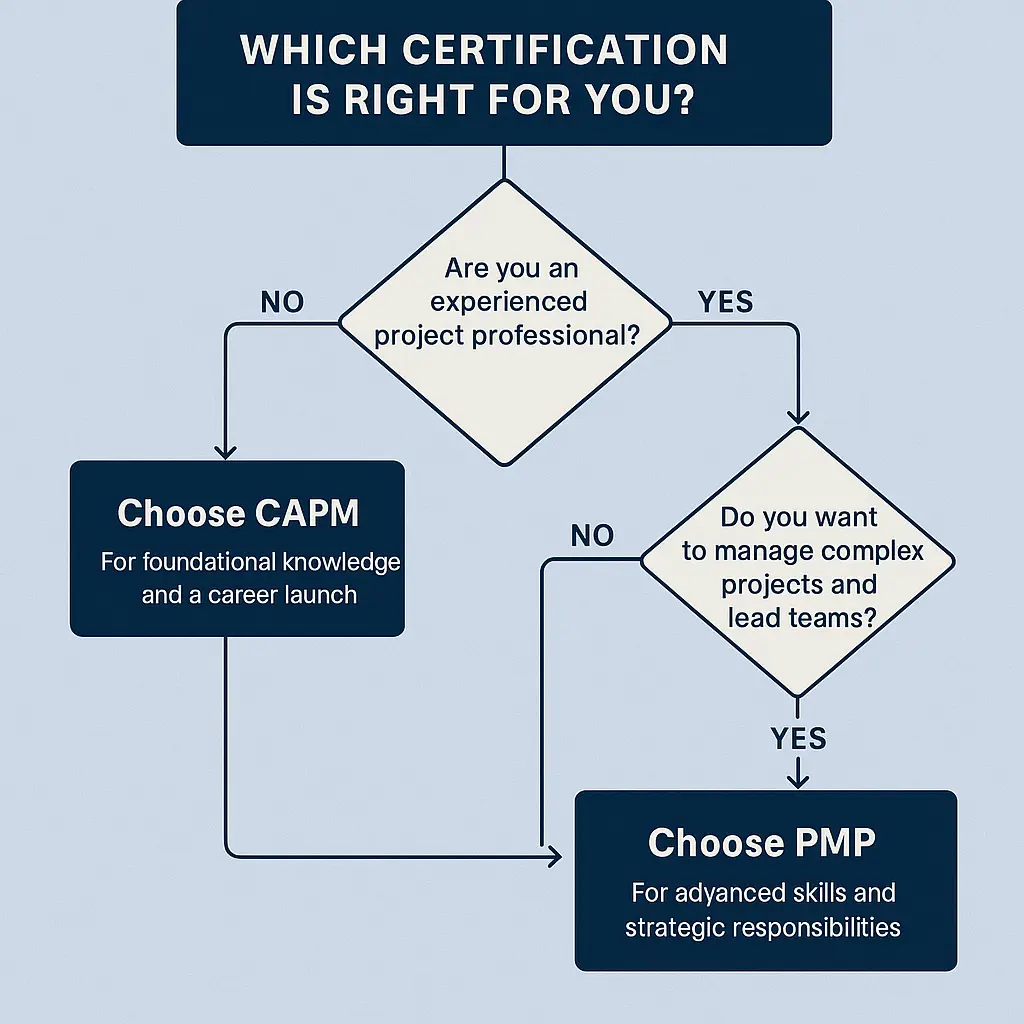CAPM® vs PMP®: Which Project Management Certification Fits Your Career Stage
By: Ryan Malaluan, CAPM®; Editor: Geram Lompon; Reviewed by: Alvin Villanueva, PMP®, PMI-ACP®
Choosing the right
The CAPM® certification provides foundational knowledge of
Understanding the distinctions between these two
Key Takeaways
- Understand the purpose and target audience of CAPM and PMP certifications.
- Learn about the eligibility criteria and PMP certification requirements.
- Discover the exam structure and content differences between the CAPM and PMP exams.
- Choose the right certification for your
project management career path. - Explore the benefits of being certified by the Project Management Institute (PMI®).
The Value of Project Management Certifications
In today’s competitive job market,
Why Certifications Matter in Project Management
Employers increasingly require PMP certification or other credentials for hiring project managers worldwide. These certification exams demonstrate your grasp of core concepts, tools, and techniques, whether you’re managing projects or aspiring to do so.
Benefits include:
- Greater respect from human resources and team members
- Access to better career development and leadership roles
- Recognition of your
project management knowledge - Enhanced salary potential in project compliance, PMO, or technical roles
The Project Management Institute (PMI) and Its Certification Framework
As a PMI authorized training partner, the institute’s role is critical in advancing professional development for
- CAPM: An entry-level certification for aspiring project professionals
- PMP: The gold standard for experienced project managers
- Supplemental certifications for specialized roles (Agile, Risk, etc.)
Their framework includes:
- Rigorous certification exams for credibility
- The globally recognized
Project Management Body of Knowledge (PMBOK Guide) - Ongoing formal course and professional development unit (PDU) requirements to maintain credentials
CAPM vs PMP: Key Differences and Similarities
Both CAPM and PMP certifications are issued by the Project Management Institute (PMI) and follow its globally recognized framework. However, they target professionals at different stages.
The CAPM certification is ideal for entry-level project managers looking to build a foundation in
Understanding how each credential aligns with your background helps you make a smart decision for your
Certification Requirements and Prerequisites
| Certification | Education | Experience | Training |
|---|---|---|---|
| CAPM | High school diploma or secondary degree | None required | 23 hours of |
| PMP | Four-year degree or equivalent | 4,500–7,500 hours of |
35 contact hours of |
This comparison highlights CAPM as an entry-level certification for those starting out, while PMP is for those with proven ability in leading projects and directing teams.
Exam Structure and Content Comparison
- CAPM Exam: Focuses on
project management fundamentals, with 150 multiple-choice questions to be completed in three hours. - PMP Exam: Assesses your ability to apply
project management principles across three domains—People, Process, and Business Environment—with complex, scenario-based questions.
The PMP exam format reflects modern practices, where half represent agile or hybrid methodologies. This shift from purely predictive
Cost and Time Investment for Each Certification
- CAPM: Lower exam costs, fewer prerequisites, and less time needed for prep. It’s ideal for those new to
project management training and certification paths. - PMP: Higher exam fees, more extensive preparation, and greater long-term commitment. PMI offers discounts based on membership status, which can ease exam costs and provide access to valuable professional development resources.
When choosing between CAPM and PMP, factor in your available time, budget, and whether you’re pursuing foundational skills or a credential for managing complex projects.
CAPM Certification: The Entry Point to Project Management
The Certified Associate in
CAPM introduces you to the
Ideal Candidates
CAPM is best suited for individuals who are just starting their
- Students or professionals with a high school diploma or associate degree
- Team members aiming to become an assistant project manager
- Individuals transitioning into managing projects
Whether you’re just beginning or moving into a new role, CAPM helps showcase your dedication and readiness to apply
Exam Preparation Strategies
Preparing for the CAPM exam means building a deep understanding of core concepts and terminology. A focused study plan will increase your chances of success. Recommended strategies include:
- Study the PMBOK Guide
- Join CAPM prep groups or take a formal course
- Practice using PMI’s sample questions
- Aim for consistency over cramming—foundational knowledge matters
These approaches not only prepare you for the exam format but also build a stronger grasp of the
Benefits and Limitations
The CAPM certification offers valuable benefits, especially for entry-level project managers, though it comes with limitations as well.
CAPM certification benefits:
- Validates your understanding of
project management fundamentals - Opens doors to entry-level project managers’ roles
- Offers a path to PMP credentials over time
Limitations:
- Requires renewal every three-year cycle
- Less recognized for leading and directing projects compared to the PMP
It’s a great starting point, but may not suffice for higher-responsibility roles without additional experience or certifications.
Career Opportunities and Salary Expectations
With CAPM, you’ll gain access to early-career roles that build your
- Junior Project Managers
- Project Coordinators
- Project support in large teams that direct project teams
Salaries depend on your educational background, skill level, and location, but most CAPM professionals earn between $60,000 and $80,000. While not as high as PMP-certified professionals, this range is competitive and provides a strong foundation for career growth in the
PMP Certification: The Gold Standard for Project Managers
For established professionals, the PMP certification is the leading credential that validates your ability to lead complex projects and direct project teams. It’s globally recognized and often required by employers seeking experienced professionals who can manage high-stakes initiatives.
PMP certification is ideal for individuals aiming to advance in their
Ideal Candidates
The PMP is designed for professionals with formal education and hands-on experience in managing projects. Eligibility depends on your academic background and hours of
- Individuals with a four-year degree and 4,500 hours of experience leading or directing projects
- Or 7,500 hours with a secondary degree (e.g., high school diploma or associate degree)
- Professionals managing complex projects and seeking to validate their leadership skills
These criteria ensure that PMP candidates are prepared for senior responsibilities in
Exam Preparation Strategies
Preparing for the PMP certification exam requires strategy, discipline, and familiarity with PMI’s framework. To improve your chances of success, follow a structured plan:
- Review the PMP handbook to understand policies and content
- Map out a study plan based on PMI’s exam content outline
- Engage in mock exams and study groups to build confidence
- Use materials approved by a PMI authorized training partner for reliable guidance
These steps help align your preparation with PMI’s expectations and ensure understanding of essential
Benefits and Advanced Opportunities
Achieving PMP certification unlocks many professional advantages, especially in high-demand industries. Here’s what certified professionals typically gain:
- Higher credibility as a PMP certified professional
- Greater leadership roles and career path flexibility
- Recognition in industries that require certification to apply
project management principles
It also boosts your potential for professional development, allowing you to transition into strategic positions that oversee teams, budgets, and timelines globally.
Career Trajectory and Salary
PMP certification elevates your career and earning potential. PMP holders are frequently hired for senior roles such as:
- Project Executive, Senior Project Manager, or Portfolio Manager
- Positions with salaries exceeding $110,000 annually, depending on experience and industry
- Leadership roles where employers require PMP certification as a hiring standard
Holding the PMP can distinguish you in the job market, positioning you as a trusted expert capable of leading enterprise-level initiatives and managing projects at scale.

Wrapping Up: Making the Right Certification Choice for Your Career Stage
Choosing between CAPM and PMP depends on your educational background, experience, and goals. If you’re new to the field, start with CAPM to build your
When to Choose CAPM:
- You are an active CAPM credential holder seeking initial validation
- You’re transitioning to
project management and need a credential to enter the field - You want to eventually take the PMP exam after gaining experience
When to Choose PMP:
- You have the experience leading projects
- You’re managing complex projects and directing teams
- You want to solidify your reputation in a global equivalent credential pool
CAPM vs PMP isn’t about which is better—it’s about which is better for you right now. Match your certification to your experience and aspirations to grow confidently in the world of
References
Glassdoor. (n.d.). Project manager salaries. Retrieved July 7, 2025, from https://www.glassdoor.com/Salaries/project-manager-salary-SRCH_KO0,16.htm
Payscale. (n.d.). Project Management Professional (PMP) salary . Retrieved July 7, 2025, from https://www.payscale.com/research/US/Certification=Project_Management_Professional_(PMP)/Salary
Project Management Institute. (n.d.). Certified Associate in
Project Management Institute. (n.d.). PMI Learning Library. Retrieved July 7, 2025, from https://www.pmi.org/learning/library#sort=relevancy
Project Management Institute. (n.d.). Project Management Professional (PMP)®. PMI. Retrieved July 7, 2025, from https://www.pmi.org/certifications/project-management-pmp

